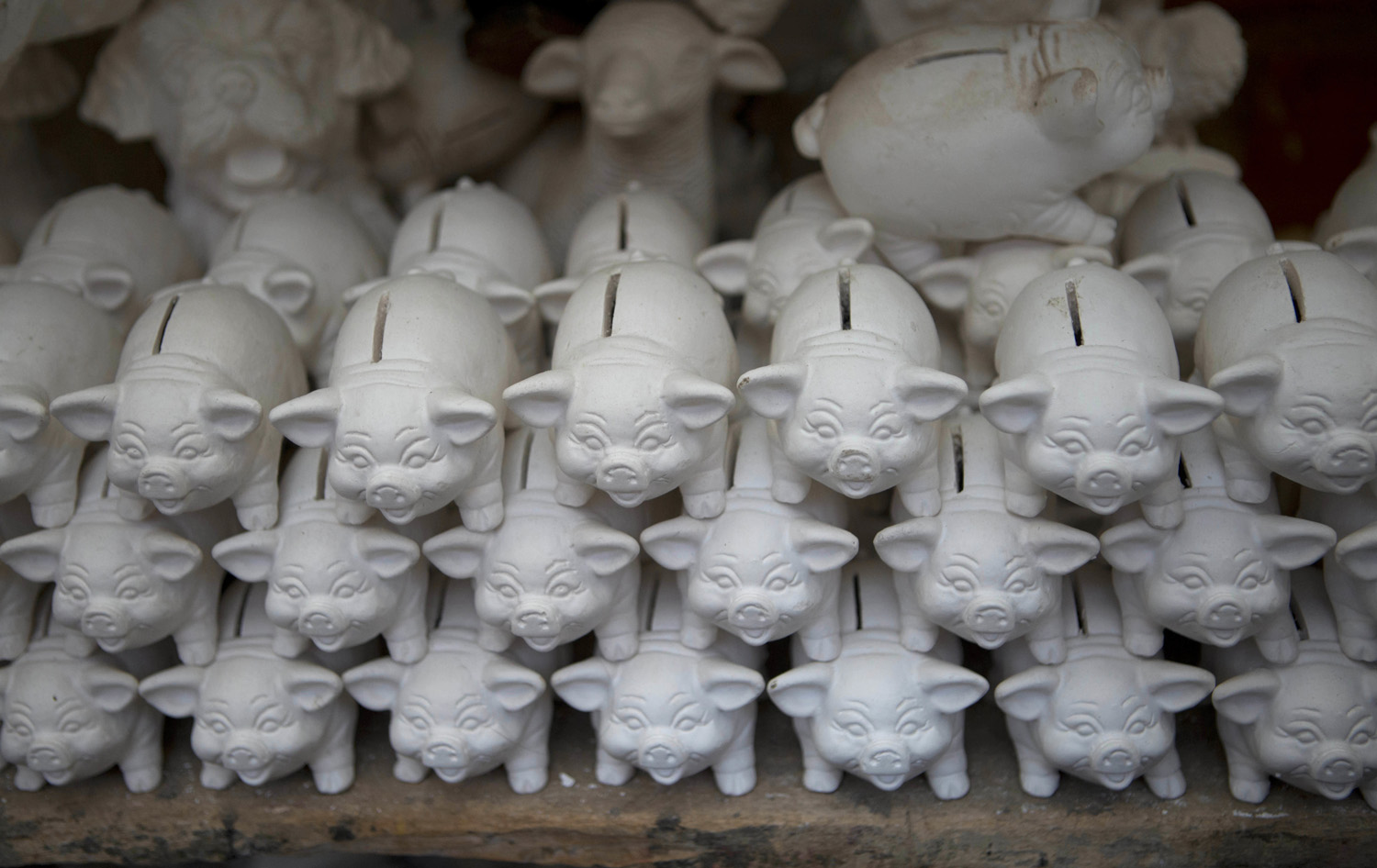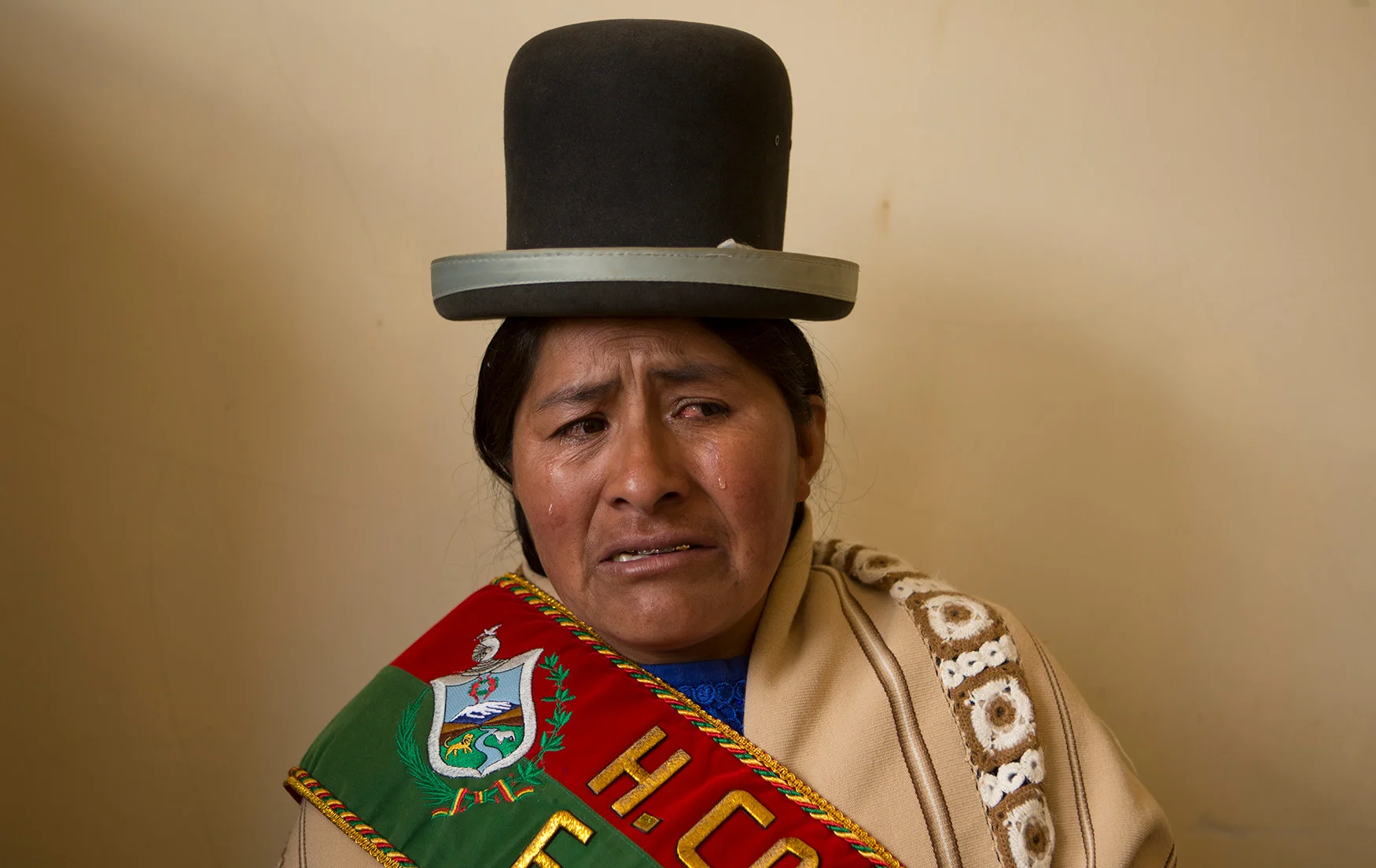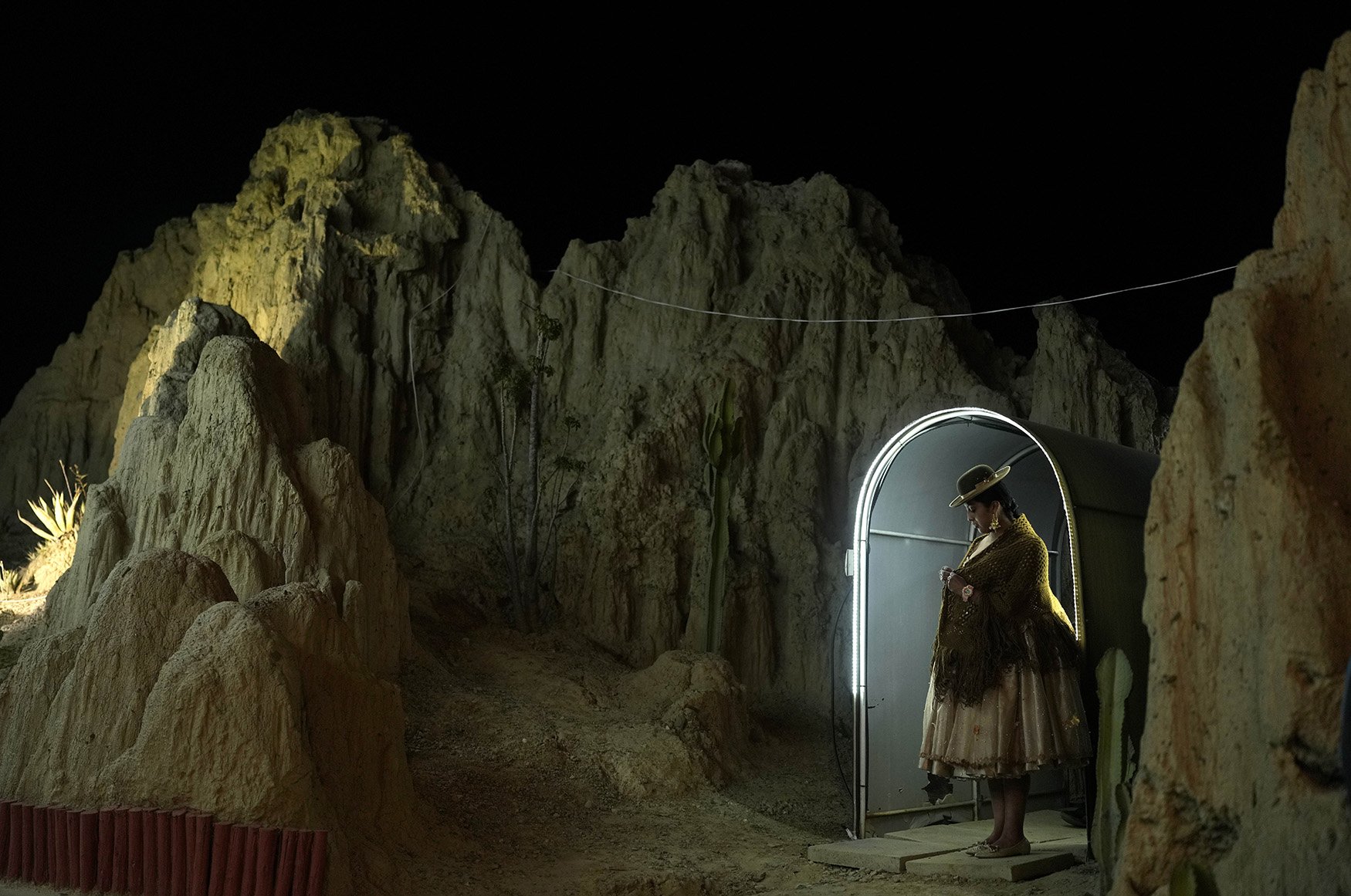Tiny objects, big dreams in Bolivia festival

Thousands of working class Bolivians crowd the streets of La Paz every year to buy miniature cars, houses and wads of fake dollar bills representing their dreams of wealth.
During the pre-Columbian tradition called the Alasitas festival, Bolivians buy tiny replicas of things they aspire to as they strive to improve their lives in South America's poorest nation.
In this Jan. 24, 2017 photo, an Aymara indigenous spiritual guide blesses statues of a miniature home and miniature food for a client during the Alasitas Fair in downtown La Paz, Bolivia. During the pre-Columbian festival, Bolivians buy tiny replicas of things they aspire to as they strive to improve their lives in South America's poorest nation. (AP Photo/Juan Karita)
The hopeful also buy statues of Ekeko, the Aymara god of abundance. He is often rendered as a short, pudgy, mustached man who wears traditional Andean clothes and carries baskets of grains. Tiny items, from kitchen appliances to college diplomas, are taken home and placed around Ekeko, who the Aymara people believe will bless them with better lives in the coming year.
"I faithfully believe in Ekeko. Thanks to him, I have everything I've asked for," said Bautista Acuna, a 44-year-old car-importer who attended the festival with his wife, carrying a statue of Ekeko.
"I asked for money, and I got it," he said. "I asked for a house, and I got it; I asked for a business, and I got it."
The Aymara word "alasita" means "buy me." The two-week festival begins every Jan. 24.
In this Jan. 16, 2017 photo, an artisan paints miniature clay homes at a workshop in El Alto, Bolivia. Artisans create miniature items for the annual Alasitas Fair, a pre-Columbian tradition where people buy tiny replicas of things they dream of owning. (AP Photo/Juan Karita)
In this Jan. 29, 2017 photo, Hilda Rosa Medina poses for a portrait with her Ekeko and fake currency inside her home during the annual Alasita fair in La Paz, Bolivia. Medina, age 72, said "Every Jan. 24 it's a family tradition, since the time of my grandparents, to buy at the Alesita with a lot of faith, and it comes true." During the pre-Columbian tradition people buy tiny replicas of things they aspire to. (AP Photo/Juan Karita)
In this Jan. 24, 2017 photo, people attend the annual Alasitas fair, some holding their miniature items, in downtown La Paz, Bolivia. Thousands of working class-Bolivians crowd the streets of La Paz every year to buy miniature cars, houses and wads of fake dollar bills representing their dreams of wealth. (AP Photo/Juan Karita)
In this Jan. 16, 2017 photo, miniature trucks dry from a fresh paint job at a workshop in El Alto, Bolivia, ahead of the annual Alesitas Fair. Tiny replicas of items people dream of acquiring are taken home and placed around a statue of Ekeko, the Aymara god of abundance, who the Aymara people believe will bless them with better lives in the coming year. (AP Photo/Juan Karita)
In this Jan. 24, 2017 photo, husband and wife, Bautista Acuna and Ana Mayta, hold an Ekeko, the Aymara god of abundance, as they pose for a portrait at the annual Alasita Fair in downtown La Paz, Bolivia. “I faithfully believe in Ekeko. Thanks to him, I have everything I’ve asked for,” said Acuna, a 44-year-old car-importer. “I asked for money, and I got it,” he said. “I asked for a house, and I got it; I asked for a business, and I got it.” (AP Photo/Juan Karita)
In this Jan. 29, 2017 photo, Bretania Alcon poses inside her home with rooster statues from the Alasita Fair, given to her by her father, brother, cousin and friend in La Paz, Bolivia. According to tradition, Alcon explained, when someone gifts you a closed beak rooster looking down, it means you'll attract a humble and quiet boyfriend. If the rooster has an open beak and is looking up, the boyfriend will be indifferent, a screamer and haughty. And if one gets many roosters, there will be no boyfriend and to wait another year. (AP Photo/Juan Karita)
In this Jan. 24, 2017 photo, people raise miniature items to be blessed by altar servers with holy water outside San Francisco Basilica during the annual Alasitas Fair in downtown La Paz, Bolivia. Thousands of working class-Bolivians crowd the streets of La Paz every year to buy miniature cars, houses and wads of fake dollar bills representing their dreams of wealth. (AP Photo/Juan Karita)
In this Jan. 16, 2017 photo, an artisan paints a small, clay home at a workshop in El Alto, Bolivia. Artisans create all sorts of miniature items for the annual Alasitas Fair, a pre-Columbian tradition where people buy tiny replicas of things they dream of owning. (AP Photo/Juan Karita)
In this Jan. 28, 2017 photo, Ana Rosario Azuga poses inside her home with her miner-themed Ekeko, the Aymara god of abundance, and miniature items in La Paz, Bolivia. Azusa, 54, said every Jan. 24 her family gives their Ekeko a cigarette, sprinkle it with alcohol and surround it with all the miniature items bought at the Alasitas Fair "so our wishes come true that year." (AP Photo/Juan Karita)
In this Jan. 13, 2017 photo, an artisan paints coin savers shaped as elephants at a workshop in El Alto, Bolivia, to sell at the Alesia Fair. The Aymara word "alasita" means "buy me." (AP Photo/Juan Karita)
A man dressed as Ekeko, the god of prosperity and the central figure of the Alasita Fair, competes at the fair's Ekeko costume contest in La Paz, Bolivia, Tuesday, Jan. 31, 2017. Ekeko is often rendered as a short, pudgy, mustached man who wears traditional Andean clothes and carries baskets of grains. Tiny items, from kitchen appliances to college diplomas, are taken home and placed around Ekeko, who the Aymara people believe will bless them with better lives in the coming year. (AP Photo/Juan Karita)
In this Jan. 27, 2017 photo, an Ekeko dressed as a miner holds a partially smoked cigarette in its mouth, surrounded by miniature objects inside the home of Ana Rosario Azuga, during the annual Alasita Fair in La Paz, Bolivia. The Ekeko is the fair's central character, revered as the Aymara god of abundance. (AP Photo/Juan Karita)
In this Jan. 24, 2017 photo, a woman counts her fake money after buying it at the annual Alasitas Fair in downtown La Paz, Bolivia. Thousands of working class-Bolivians crowd the streets of La Paz every year to buy miniature cars, houses and wads of fake dollar bills representing their dreams of wealth. (AP Photo/Juan Karita)
In this Jan. 13, 2017 photo, clay piggy banks are stacked before getting a paint job at a workshop in El Alto, Bolivia. Artisans create miniatures for the annual Alasitas Fair, a pre-Columbian tradition where people buy tiny replicas of things they dream of owning. (AP Photo/Juan Karita)
In this Jan. 24, 2017 photo, a man holds up fake currency to be blessed by altar servers outside of the Basilica of San Francisco during the annual Alasitas fair in downtown La Paz, Bolivia. Thousands of working class-Bolivians crowd the streets of La Paz every year to buy miniature cars, houses and wads of fake dollar bills representing their dreams of wealth. (AP Photo/Juan Karita)
In this Jan. 24, 2017 photo, boyfriend and girlfriend Alexander Reynoso and Anahi Silva pose with a statue of an owl and an elephant during the annual Alasita fair in downtown La Paz, Bolivia. Silva, who's studying medicine, said she bought the owl for wisdom and prosperity as she reaches her goal of becoming a doctor. Reynoso said he bought the elephant for strength and vigor to help him carry on and reach his goals. (AP Photo/Juan Karita)
Text from the AP news story, AP Photos: Tiny objects, big dreams in Bolivia festival.
Photos by Juan Karita
Follow AP photographers on Twitter
See these photos on APImages
Written content on this site is not created by the editorial department of AP, unless otherwise noted.





